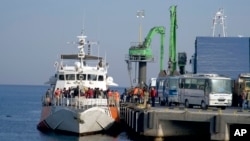Ankara is warning of serious consequences if the German parliament passes a motion accusing Turkey’s then-Ottoman rulers of genocide against its Armenian minority. Turkey and Germany have close economic and political ties and Berlin has become dependent on Ankara to stem migrants entering the European Union.
Turkish Prime Minister Binali Yildirim Wednesday condemned a potential Bundestag vote on a motion that accuses Turkey’s Ottoman rulers of genocide against its Armenian minority in 1915.
He said this vote is very absurd and that there is no truth to it. It is one of the ordinary events that could be lived in any country in 1915 under the conditions of World War I. He said if the vote passes, Turkey's relations with Germany undoubtedly will be harmed.
Yildirim’s warning followed even sterner language from Turkish President Recep Tayyip Erdogan, who on Tuesday threatened serious repercussions.
Germany's parliament is due to vote on the bill Thursday.
‘Tough rhetoric’
Ankara insists those killed in the 1915 mass killings died as a result of a civil war. More than 20 countries, including several in Europe, recognize the killings as genocide; but, political scientist Cengiz Aktar of Istanbul’s Suleyman Sah University says despite the threats, there will be few far-reaching consequences.
"There is a tough rhetoric on the Turkish side, but I frankly don't expect a spectacular reaction by Ankara. If the motion goes through, which is highly probable, there will be all sorts of nationalist propaganda for internal purposes. They may recall the ambassador," Aktar said.
One of the main reasons widely cited as to why few expect little long-term damage to bilateral relations if, as expected, the motion passes, is that Germany is simply too important to Turkey. Diplomatic columnist Semih Idiz of Turkey ’s Cumhuriyet newspaper and Al Monitor website says Ankara has few options to punish Berlin.
"It's not as if Turkey can sever diplomatic ties with Germany, given the 3 million Turks living in Germany. It can't take sanctions against German companies, because it will be shooting itself in the foot. A lot of German companies have a Turkish component in them, operating in Turkey," Idiz said.
Migrant deal as leverage
Ankara believes its most important diplomatic leverage over Europe is a recently agreed-to migrant deal with the European Union, which has seen a marked reduction in the number of people entering Greece from Turkey. Observers say the deal is especially important to German Chancellor Angela Merkel, who is desperate to stem the number of migrants entering Germany. Columnist Idiz says Ankara will likely refrain from jeopardizing the deal.
"Well, Germany depends on the migrants deal. Turkey has been using this as a kind of stick, if you don't honor your side, we will not honor our side; but, the migrant issue, the refugee issue, is not just a one-sided problem. Turkey has this problem also and whether it likes or not, it will have the kind of arrangement with Europe over this," Idiz said.
Analysts say Ankara is unlikely to use the leverage it has over the migrant deal to simply punish Berlin. More likely, it will want to use the deal to secure the more important goal of ensuring the EU honor its commitment to visa-free travel for Turkish citizens.






